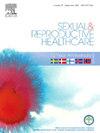Midwives’ experiences and challenges in addressing intimate partner violence: A qualitative study at youth clinics in Stockholm
IF 1.7
3区 医学
Q3 PUBLIC, ENVIRONMENTAL & OCCUPATIONAL HEALTH
引用次数: 0
Abstract
Objective
This study aimed to investigate midwives’ experiences of asking adolescents at youth clinics about their experiences of intimate partner violence (IPV).
Methods
This qualitative interview study used semi-structured questions and inductive reflexive thematic analysis. Purposeful sampling focused on midwives working in youth clinics in the Stockholm region. Of the 29 youth clinics approached, nine agreed to participate, resulting in 24 midwives participating. Data were collected through semi-structured interviews and analyzed using reflexive thematic analysis by Braun and Clarke’s six-phase framework.
Results
The findings are presented in three main themes with nine sub-themes. Midwives face challenges in addressing violence, balancing their sense of duty with the need to create a safe environment for youth. Strategies for detecting and asking about IPV varied, with midwives employing different approaches and facing organizational challenges. The need for professional development and clear guidelines was emphasized, highlighting the importance of collegial support and established routines.
Conclusion
Youth clinics are essential for identifying adolescents exposed to violence, with midwives ideally positioned to support those affected by IPV. However, midwives face challenges in inquiring about IPV and require appropriate conditions, including tools, training, time, and clear procedures. Enhanced training and support for midwives could improve the identification and management of IPV. Further research is needed to explore how various tools can facilitate midwives in inquiring about IPV and to understand youths’ perspectives on being asked about violence.
助产士在处理亲密伴侣暴力方面的经验和挑战:斯德哥尔摩青年诊所的定性研究
目的调查助产士在青少年诊所询问青少年亲密伴侣暴力(IPV)经历的情况。方法采用半结构化问题和归纳反身性主题分析进行定性访谈研究。有目的的抽样侧重于在斯德哥尔摩地区青年诊所工作的助产士。在接触的29家青年诊所中,有9家同意参与,总共有24名助产士参与。通过半结构化访谈收集数据,并使用Braun和Clarke的六阶段框架进行反身性主题分析。结果研究结果分为三个主题和九个副主题。助产士在处理暴力、平衡他们的责任感和为青年创造安全环境的需要方面面临挑战。发现和询问IPV的策略各不相同,助产士采用不同的方法并面临组织挑战。会议强调了专业发展和明确准则的必要性,强调了学院支持和既定程序的重要性。结论青少年诊所对于识别遭受暴力的青少年至关重要,助产士的理想定位是为受IPV影响的青少年提供支持。然而,助产士在询问IPV方面面临挑战,需要适当的条件,包括工具、培训、时间和明确的程序。加强对助产士的培训和支持可以改善IPV的识别和管理。需要进一步的研究,以探索各种工具如何促进助产士询问IPV,并了解青少年对被问及暴力问题的看法。
本文章由计算机程序翻译,如有差异,请以英文原文为准。
求助全文
约1分钟内获得全文
求助全文
来源期刊

Sexual & Reproductive Healthcare
PUBLIC, ENVIRONMENTAL & OCCUPATIONAL HEALTH-
CiteScore
2.70
自引率
5.60%
发文量
73
审稿时长
45 days
 求助内容:
求助内容: 应助结果提醒方式:
应助结果提醒方式:


